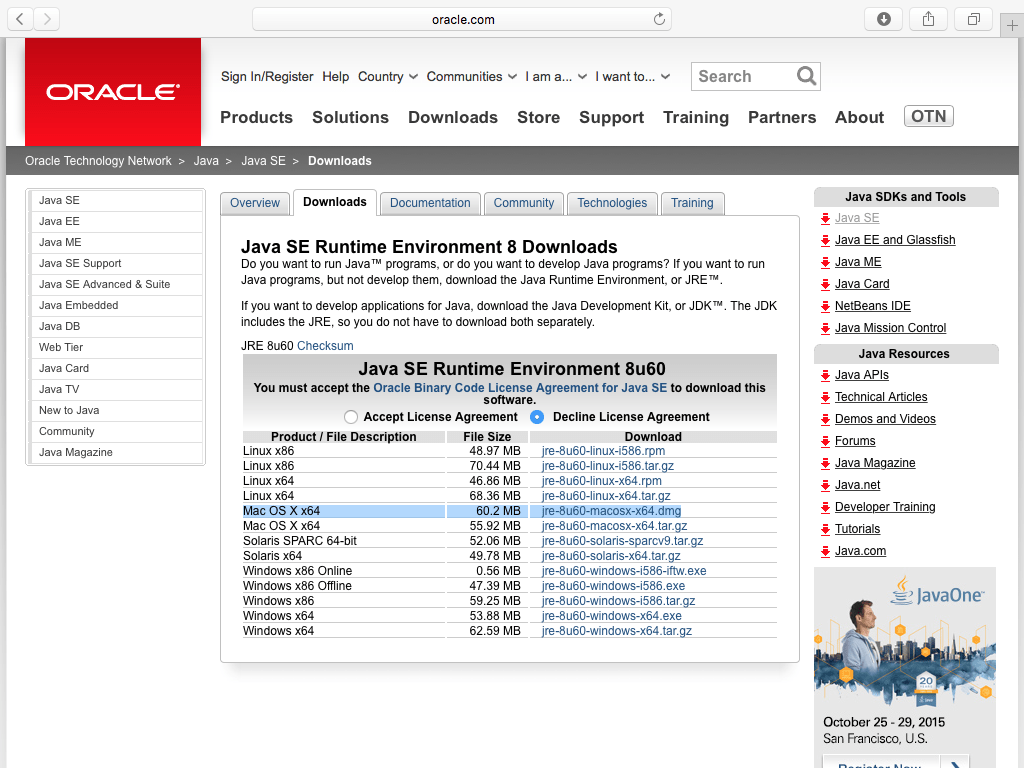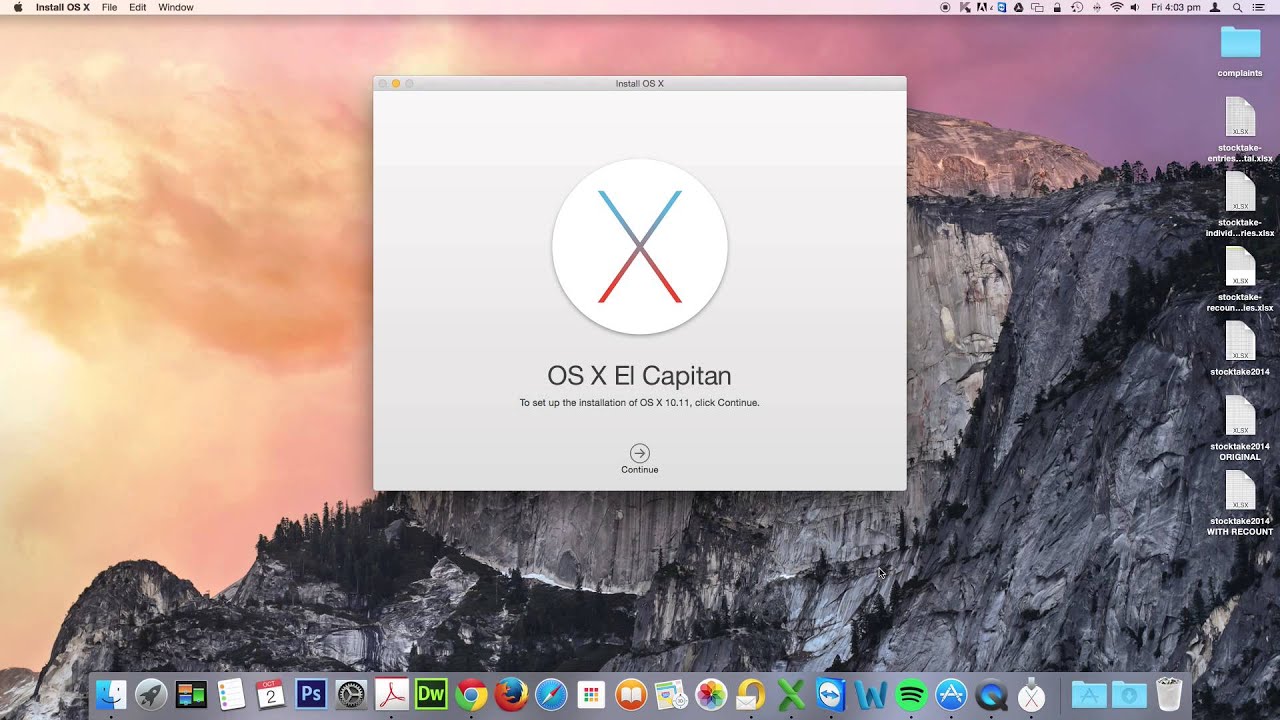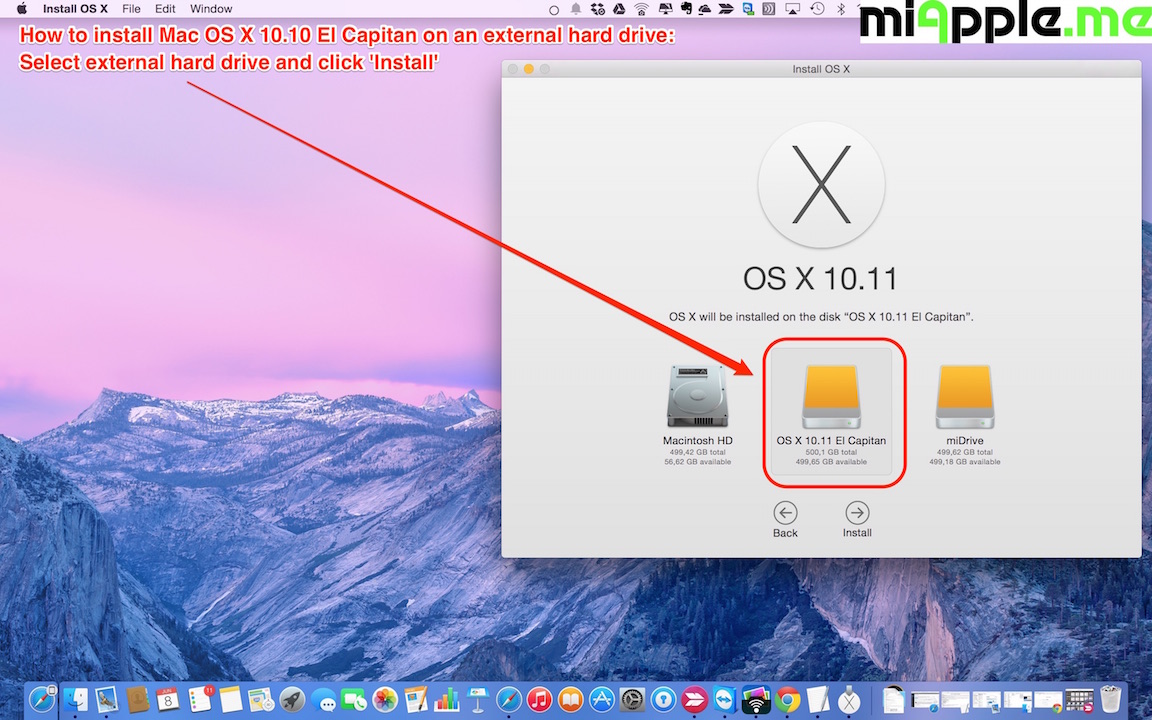- Java for OS X 2015-001 installs the legacy Java 6 runtime for OS X 10.11 El Capitan, OS X 10.10 Yosemite, OS X 10.9 Mavericks, OS X 10.8 Mountain Lion, and OS X 10.7 Lion. This package is exclusively intended for support of legacy software and installs the same deprecated version of Java 6 included in the 2014-001 and 2013-005 releases.
- Download Java for OS X 2017-001. Java for macOS 2017-001 installs the legacy Java 6 runtime for macOS 10.13 High Sierra, macOS 10.12 Sierra, macOS 10.11 El Capitan, macOS 10.10 Yosemite, macOS 10.9 Mavericks, macOS 10.8 Mountain Lion, and macOS 10.7 Lion. This package is exclusively intended for support of legacy software and installs the same.
- Apple heeft te kennen gegeven dat Mac OS X 10.11 (El Capitan) de laatste release van OS X zal zijn waarin Java 6 wordt ondersteund. Ontwikkelaars met applicaties die afhankelijk zijn van Java 6, wordt dan ook aangeraden hun applicaties te migreren naar een recentere Java.
Since I upgraded my Mac to OS X El Capitan (version 10.11.2) I am having problems with the R-package rJava. From what I understood, eventually, it is not a problem of rJava or R or RStudio in the first place, but newer versions of Mac OS X do not play well with the latest versions of Oracle’s Java (jdk). Furthermore, some new security features in Mac OS X prevent that environment path settings are passed along to applications like RStudio.
In what follows, I listed the steps that solved for me the problem that the package rJava could not be loaded from within RStudio under Mac OS X El Capitan (version 10.11.2).
Os x el capitan free download - Apple Mac OS X El Capitan, Apple Mac OS X Mavericks, R for Mac OS X, and many more programs. Patch Java SE 6 components. Free User rating. Publisher: Apple. Apple heeft te kennen gegeven dat Mac OS X 10.11 (El Capitan) de laatste release van OS X zal zijn waarin Java 6 wordt ondersteund.
Problem statement
Unfortunately, the package rJava does not just fail to load, but the R GUI for Mac terminates instantly and in RStudio the R-session gets closed. Both effects are pretty annoying! See the screen shot below on how that might look like.
Some research

After searching the web, the details of the problem are still not clear to me. But it appears that OS X has problems recognizing newer versions Oracle’s Java. OS X seams to be looking for a legacy version 6 of Apple’s own build of Java. As shown in the next section one solution seams to be the installation of Apple’s legacy version 6 of Java and a newer version (e.g. 1.8.0_66) of Oracle’s Java at the same time.
The solution
The post available at https://github.com/snowflakedb/dplyr-snowflakedb/wiki/Configuring-R-rJava-RJDBC-on-Mac-OS-X solved my problem with rJava on Mac OS X 10.11.2.
Java 6
I already had XCode command line tools installed, so I started at section Java 6. I downloaded the legacy Java 6 runtime from https://support.apple.com/kb/DL1572?locale=de_DE and installed the downloaded .dmg file.
Java 8
Since I had already installed the latest version of Oracle’s jdk from http://www.oracle.com/technetwork/java/javase/downloads/jdk8-downloads-2133151.html, I skipped the step.
The output of java_home on my machine looks as follows
Please note the 1.7 version are really not needed here.
R for OS X
The latest version of R was already running, so I skipped this step. The check with javareconf gave the following result.
rJava
As the version of rJava from CRAN did not work, I took the latest version from rforge and installed that one.
A quick check whether rJava can be loaded, is done as follows
RStudio

Running the above check on the RStudio console still gives the following error
For some reason which might be connected to a new security feature of Mac OS X, the file libjvm.dylib cannot be found. Loading this library explicitly, as was described in http://stackoverflow.com/questions/30738974/rjava-load-error-in-rstudio-r-after-upgrading-to-osx-yosemite, finally solves the problem.
I recently upgraded my Mac Computer from version 10.10 Yosemite to 10.11 EL Capitan, trying to Open eclipse gave me the following error, To open 'Eclipse' you need to install the legacy java 6 runtime. Java for macOS 2017-001 installs the legacy Java 6 runtime for macOS 10.13 High Sierra, macOS 10.12 Sierra, macOS 10.11 El Capitan, macOS 10.10 Yosemite, macOS 10.9 Mavericks, macOS 10.8 Mountain Lion, and macOS 10.7 Lion.
Jul 20, 2015 How to install a compatible Java version in OS X El Capitan? Look at our simple tip below. There are 2 easiest and quickest ways to install right Java version on Mac. They work all on OS X – El Capitan, Yosemite and mavericks. 1 – Grab a El Capitan Compatible Java Version from Apple. Dec 31, 2019 In the Java ecosystem, as the new releases of JDK are introduced at least once a year, we'll probably need to switch to a newer version at some point. In this quick tutorial, we'll show how to check the available JREs, add a JRE to Eclipse, and change a Java version in an Eclipse project, so we'll be ready when that time comes. Running some applications on Mac version 10.12 Sierra, 10.10 Yosemite and 10.11 El Capitan, users are asked to install Java even after installing the latest version of Java.
Latest Version:
Eclipse SDK 4.16 (64-bit) LATEST
Requirements:
Windows XP64 / Vista64 / Windows 7 64 / Windows 8 64 / Windows 10 64
Author / Product:
The Eclipse Foundation / Eclipse SDK (64-bit)
Endpoint security checkpoint vpn for mac catalina download. Old Versions:
Filename:
Enable home sharing mac os catalina for tv shows. eclipse-SDK-4.16-win32-x86_64.zip
Details:
Eclipse SDK (64-bit) 2020 full offline installer setup for PC
Latest Version Of El Capitan

Download Java 8 For Mac El Capitan
Eclipse Java Version For El Capitan 8
Java 6 Mac Os El Capitan
- Enterprise Development
- Embedded and Device Development
- Rich Client Platform
- Rich Internet Applications
- Application Frameworks
- Application Lifecycle Management (ALM)
- Service-Oriented Architecture (SOA)
Java 6 For Mac El Capitan
Subprojects
Platform
The Platform defines the set of frameworks and common services that collectively make up 'integration-ware' required to support the use of Eclipse as a component model, as a rich client platform (RCP) and as a comprehensive tool integration platform. These services and frameworks include a standard workbench user interface model and portable native widget toolkit, a project model for managing resources, automatic resource delta management for incremental compilers and builders, language-independent debug infrastructure, and infrastructure for distributed multi-user versioned resource management.
JDT - Java development tools
The JDT provides the tool plug-ins for the platform that implement a Java IDE for power-users, that supports the development of any Java application, including plug-ins. The JDT adds the notion of Java projects and a Java perspective to the platform, as well as a number of views, editors, wizards, builders, and code merging and refactoring tools. The JDT allows Eclipse to be a development environment for itself. The JDT plug-ins themselves can also be further extended by other tool builders.
PDE - Plug-in development environment
The PDE project provides a number of views and editors that make it easier to build plug-ins for Eclipse SDK. Using the PDE, you can create your plug-in manifest file (plugin.xml), specify your plug-in runtime and other required plug-ins, define extension points, including their specific markup, associate XML Schema files with the extension point markup so extensions can be validated, create extensions on other plug-in extension points, etc. The PDE makes integrating plug-ins easy and fun.
e4 - The next generation of the platform
The e4 project is an incubator for developing the next generation of the platform. The mission of the e4 project is to build a next-generation platform for pervasive, component-based applications, and tools.
Note: Requires Java Runtime Environment.
Also Available: Download Eclipse for Mac